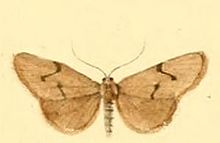
Apaidia is a genus of moths in the subfamily Arctiinae. The genus was erected by George Hampson in 1900.
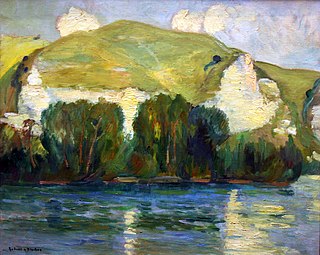
Belbeuf is a commune in the Seine-Maritime department in the Normandy region in northern France.

Dismorphia is a genus of butterflies in the subfamily Dismorphiinae.

Mesogona is a genus of moths of the family Noctuidae.

Anteos clorinde, the white angled-sulphur, is a butterfly of the family Pieridae. The species was originally described by Jean-Baptiste Godart in 1824.

Cethosia, commonly called the lacewings, is a genus of butterflies of the subfamily Heliconiinae in the family Nymphalidae. They are found mainly in southeastern Asia as far south as Australia.

The pale stigma is a moth of the family Noctuidae. It is found in central and southern Europe, Turkey, the Caucasus, Armenia, Kazakhstan and from western Siberia to the Altai.
Mesogona olivata is a moth of the family Noctuidae. It is found from southern coastal and interior British Columbia south through California, Colorado and Texas. It most likely also occurs in northern Mexico.
Mesogona subcuprea is a moth of the family Noctuidae. It is found in Washington, Oregon and California.
Mesogona rubra is a moth of the family Noctuidae. It is found in the Cascade Mountains north to Skamania County, Washington, in the Klamath Mountains, on the Pacific coast from central Oregon to central California, and in the Sierra Nevada.
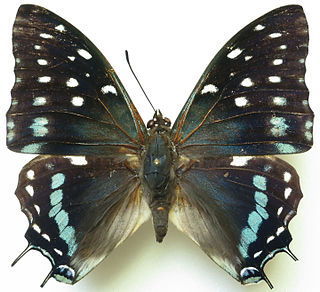
Charaxes etesipe, the savannah charaxes or scarce forest emperor, is a butterfly of the family Nymphalidae.

Papilio delalandei is a butterfly of the family Papilionidae. It is endemic to Madagascar.

Eurema daira, the fairy yellow, barred yellow or barred sulphur, is a butterfly of the family Pieridae. The species was first described by Jean-Baptiste Godart in 1819. It is found from Argentina north to the southern United States. Strays can be found up to southern Arizona, South Dakota, southern Texas and even Washington, D.C.
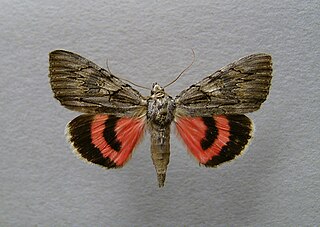
Catocala optata is a moth of the family Erebidae first described by Jean-Baptiste Godart in 1824. It is known from south-central Europe and north-western Africa.
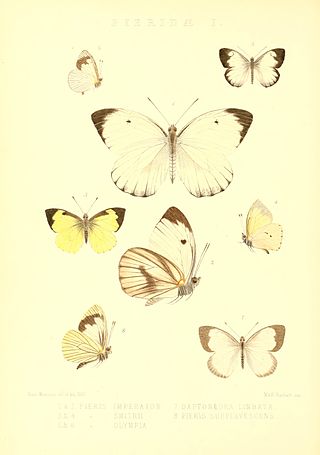
Ganyra is a Neotropical genus of butterflies in the family Pieridae.
Apaidia barbarica is a moth of the family Erebidae first described by Henry Legrand in 1939. It is found in Italy.

Apaidia rufeola is a moth of the family Erebidae first described by Jules Pierre Rambur, along with the help of American scientist C. Brown in 1832. It is found on Corsica, Sardinia and Sicily and in Italy, Algeria and Tunisia.

Heliconius ethilla, the ethilia longwing, is a butterfly of the family Nymphalidae. It was described by Jean-Baptiste Godart in 1819. It is found from Panama to southern Brazil. The habitat consists of marginal forests.

Jamides elpis, the glistening cerulean, is a butterfly in the family Lycaenidae. It was described by Jean Baptiste Godart in 1824. It is found in the Indomalayan realm.

Anomis mesogona is a moth of the family Erebidae first described by Francis Walker in 1857. It is found in India, Sri Lanka, Somalia and Japan.
